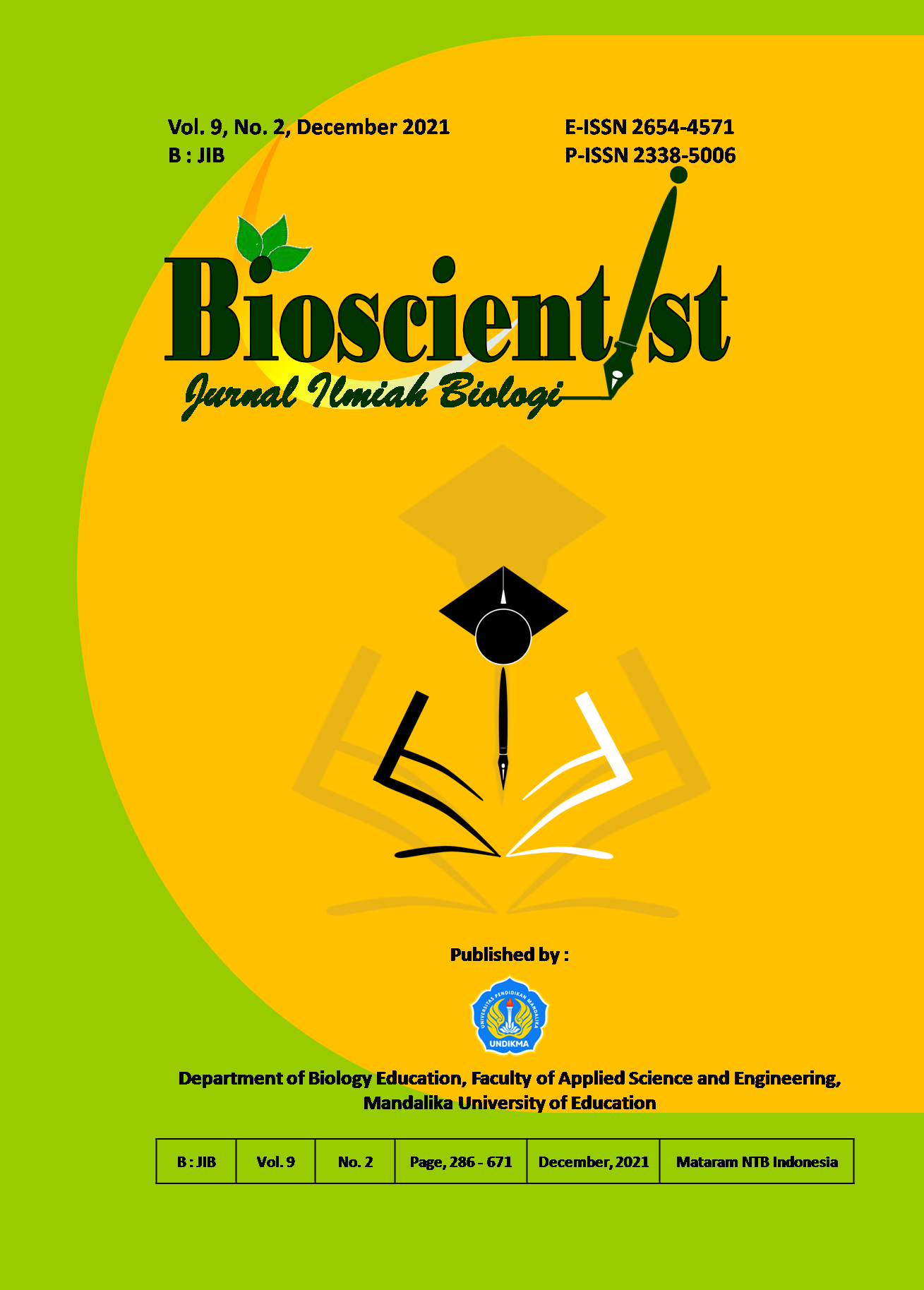Validation of the Indonesian Version of the Epistemological Belief Questionnaire
DOI:
https://doi.org/10.33394/bioscientist.v9i2.4371Keywords:
Epistemological Beliefs, Exploratory Factor Analysis, Confirmatory Factor Analysis, Prospective Teachers.Abstract
References
Akbay, T., Akbay, L., and Gülsoy, V.G.B. (2018). Causal Effect of Epistemological Beliefs and Metacognition on Critical Thinking Disposition. Mehmet Akif Ersoy Üniversitesi Eğitim Fakültesi Dergisi, 45, 88-104.
Angeli, C., and Valanides, N. (2012). Epistemological Beliefs and Ill-Structured Problem-Solving in Solo and Paired Contexts. Educational Technology & Society, 15(1), 2-14.
Bahçivan, E. (2016). Investigating the Relationships Among PSTs’ Teaching Beliefs: Are Epistemological Beliefs Central? Educational Studies, 42(2), 221-238.
Brownlee, J.L., Ferguson, L.E., and Ryan, M. (2017). Changing Teachers’ Epistemic Cognition: A New Conceptual Framework for Epistemic Reflexivity. Educational Psychologist, 52(4), 242-252.
Cole, R.P., Goetz, E.T., and Willson, V. (2014). Epistemological Beliefs of Underprepared College Students. Journal of College Reading and Learning, 31(1), 60-72.
Conley, A.M., Pintrich, P.R., Vekiri, I., and Harrison, D. (2004). Changes in Epistemological Beliefs in Elementary Science Students. Contemporary Educational Psychology, 29(2), 186-204.
Ekinci, N. (2017). Examining the Relationships between Epistemological Beliefs and Teaching and Learning Conceptions of Lower-Secondary Education Teachers. İnönü Üniversitesi Eğitim Fakültesi Dergisi, 8(1), 344-358.
Ghazali, N., and Nordin, M.S. (2019). Measuring Meaningful Learning
Experience: Confirmatory Factor Analysis. International Journal of Innovation, Creativity, and Change, 9(12), 283-296.
Hadi, N.U., Abdullah, N., and Sentosa, I. (2016). An Easy Approach to Exploratory Factor Analysis: Marketing Perspective. Journal of Educational and Social Research, 6(1), 215-223.
Hamid, M.R.A., Sami, W., and Sidek, M.H.M. (2017). Discriminant Validity Assessment: Use of Fornell & Larcker Criterion Versus HTMT Criterion. Journal of Physics: Conference Series, 890, 1-5.
Heale, R., and Twycross, A. (2015). Validity and Reliability in Quantitative Studies. Evidence Based Nursing, 18(3), 66-67.
Hofer, B.K., and Bendixen, L.D. (2012). Personal Epistemology: Theory, Research, and Future Directions. Washington, D.C.: American Psychological Association.
Hu, Z., and Li, J. (2015). The Integration of EFA and CFA: One Method of Evaluating the Construct Validity. Global Journal of Human-Social Science: A Arts & Humanities - Psychology, XV(VI), 16-19.
Hyytinen, H., Holma, K., Toom, A., Shavelson, R.J., and Ylänne, S.L. (2014). The Complex Relationship between Students’ Critical Thinking and Epistemological Beliefs in the Context of Problem Solving. Frontline Learning Research, 6, 1-25.
Kim, H., Ku, B., Kim, J.Y., Park, Y.J., and Park, Y.B. (2016). Confirmatory and Exploratory Factor Analysis for Validating the Phlegm Pattern Questionnaire for Healthy Subjects. Evidence-Based Complementary and Alternative Medicine, 2016, 1-8.
Koyuncu, İ., and Kılıç, A.F. (2019). The Use of Exploratory and Confirmatory Factor Analyses: A Document Analysis. Eğitim ve Bilim, 44(198), 361-388.
Langcay, M., Gutierrez, J.P., Valencia, M.M., and Tindowen, D.J. (2019). Epistemological Beliefs of Pre-service Teachers. Journal of Social Sciences and Humanities, 5(2), 37-45.
Lee, C.Y., and Yuan, Y. (2012). Taiwan Junior High School Adolescents’ Epistemological Beliefs Toward Mathematics and Science. ISRN Education, 2012, 1-7.
Lee, W.W.S., and Chan, C.K.K. (2015). Identifying and Examining Epistemic Beliefs Among College Students in Hong Kong. The Asia-Pacific Education Researcher, 24(4), 603-612.
Mayers, A. (2013). Introduction to Statistics and SPSS in Psychology. London: Pearson Education.
Mellat, N., and Lavasani, M.G. (2011). The Role of Epistemological Beliefs, Motivational Constructs and Information Processing Strategies in Regulation of Learning. Procedia - Social and Behavioral Sciences, 30, 1761-1769.
Muhammad, N.A., Shamsuddin, K., Amin, R.M., Omar, K., and Thurasamy, R. (2017). Questionnaire Development and Validity to Measure Sexual Intention Among Youth in Malaysia. BMC Public Health, 17(1), 1-10.
Orakcı, Ş., Dilekli, Y., and Erdağ, C. (2020). The Structural Relationship between Accountability Felt and Responsible Teaching in Turkish Teachers: The Mediating Effect of Innovative Thinking. Thinking Skills and Creativity, 36, 1-10.
Ortwein, M., McCullough, A.C., and Thompson, A. (2015). A Qualitative Analysis of Teachers’ Understandings of the Epistemic Aims of Education. Journal of Education and Human Development, 4(3), 161-168.
Ponto, J. (2015). Understanding and Evaluating Survey Research. Journal of the Advanced Practitioner in Oncology, 6(2), 168-171.
Reddy, L. (2020). An Evaluation of Undergraduate South African Physics Students’ Epistemological Beliefs When Solving Physics Problems. EURASIA Journal of Mathematics, Science and Technology Education, 16(5), 1-11.
Rott, B. (2021). Epistemological Beliefs and Critical Thinking in Mathematics: Qualitative and Quantitative Studies with Pre-Service Teachers. Switzerland: Springer Spektrum.
Sadi, Ö., and Dağyar, M. (2015). High School Students’ Epistemological Beliefs, Conceptions of Learning, and Self-Efficacy for Learning Biology: A Study of Their Structural Models. EURASIA Journal of Mathematics, Science and Technology Education, 11(5), 1061-1079.
Saeed, F.T., and Kassim, R.M. (2017). Validation Measurement Model of Media Staffs Satisfaction, Leadership, Pay, Working Environment, Rewards and Performance. World Journal of Research and Review, 5(3), 84-88.
Schraw, G. (2013). Conceptual Integration and Measurement of Epistemological and Ontological Beliefs in Educational Research. ISRN Education, 2013, 1-19.
Schreiber, J.B., and Shinn, D. (2011). Epistemological Beliefs of Community College Students and Their Learning Processes. Community College Journal of Research and Practice, 27(8), 699-709.
Shrestha, N. (2021). Factor Analysis as a Tool for Survey Analysis. American Journal of Applied Mathematics and Statistics, 9(1), 4-11.
Stacciarini, T.S.G., and Pace, A.E. (2017). Confirmatory Factor Analysis of the Appraisal of Self-Care Agency Scale-Revised. Revista Latino-Americana de Enfermagem, 25, 1-9.
Topcu, M.S. (2013). Preservice Teachers’ Epistemological Beliefs in Physics, Chemistry, and Biology: A Mixed Study. International Journal of Science and Mathematics Education, 11(2), 433-458.
Topçu, M.S., Tüzün, Ö.Y., and Sadler, T.D. (2011). Turkish Preservice Science Teachers’ Informal Reasoning Regarding Socioscientific Issues and the Factors Influencing Their Informal Reasoning. Journal of Science Teacher Education, 22(4), 313-332.
Trizano-Hermosilla, I., and Alvarado, J.M. (2016). Best Alternatives to Cronbach’s Alpha Reliability in Realistic Conditions: Congeneric and Asymmetrical Measurements. Frontiers in Psychology, 7, 1-8.
Ünlü, Z.K., and Dökme, İ. (2017). Science Teacher Candidates’ Epistemological Beliefs and Critical Thinking Disposition. Eurasian Journal of Educational Research, 72, 203-220.
Villafañe, S.M., Bailey, C.P., Loertscher, J., Minderhout, V., and Lewis, J.E. (2011). Development and Analysis of an Instrument to Assess Student Understanding of Foundational Concepts Before Biochemistry Coursework. Biochemistry and Molecular Biology Education, 39(2), 102-109.
Yenice, N., and Özden, B. (2015). Analysis of Scientific Epistemological Beliefs of Eighth Graders. Educational Sciences: Theory & Practice, 15(6), 1623-1636.
Zait, A., and Bertea, P.E. (2011). Methods for Testing Discriminant Validity. Management & Marketing, IX(2), 217-224.













